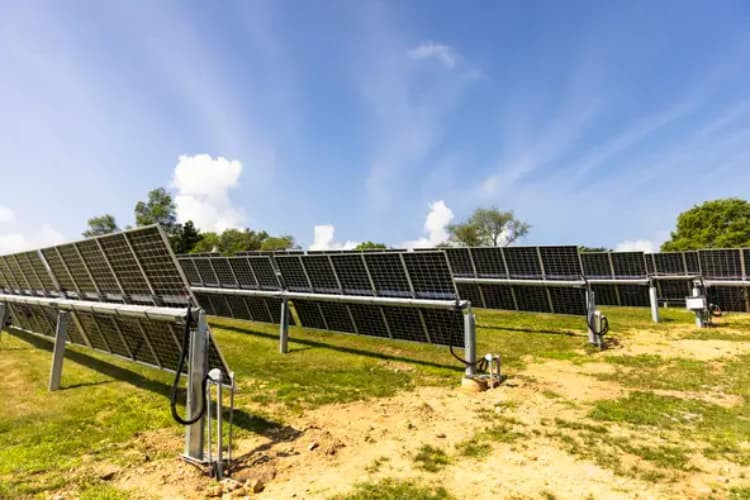Waldom Electronics Solar Panel Project Cuts CO₂ at HQ
In The News | 23-07-2025 | By Matthew Walker

Key Things to Know:
- Waldom Electronics has installed 760 solar panels at its Rockford HQ, generating an estimated 38,000 kWh of clean energy monthly.
- The solar system is projected to offset over 7,000 tons of CO₂ across 20 years—the equivalent of 106,000 trees or 15.8 million miles driven.
- Designed and deployed by Orbital Energy, the system reflects a scalable model for clean energy adoption in industrial supply chain facilities.
- The initiative complements Waldom’s broader ESG framework, including its Green Stock Program, which has repurposed 8+ billion components.
As environmental responsibility becomes a growing priority across the global electronics supply chain, Waldom Electronics has taken a decisive step toward operational sustainability. At a recent ribbon-cutting ceremony held at its Rockford headquarters, the company unveiled a newly commissioned solar energy system, signalling not only a reduction in on-site carbon emissions but also a broader alignment with evolving ESG expectations in component distribution. The move underscores Waldom’s strategic positioning as an infrastructure-forward, sustainability-conscious player in a sector where efficiency and environmental impact increasingly intersect.
With over 760 solar panels now live, this transition raises a critical question: Can green energy integration redefine supply chain sustainability across the component distribution sector?
From Roof to Grid – Inside Waldom’s Solar Infrastructure Investment
Waldom Electronics’ new solar installation isn’t just a visual upgrade to its Rockford headquarters; it’s a fully integrated clean energy solution designed with long-term impact in mind. The system comprises 760 single-axis tracking solar panels, engineered to follow the sun’s path and optimise energy capture throughout the day. With an estimated monthly output of 38,000 kilowatt-hours, the array is expected to make a measurable dent in the company’s energy footprint.
From an environmental perspective, the numbers are equally compelling. Over the next 20 years, the system is projected to offset more than 7,000 tons of CO₂ emissions, the equivalent of 15.8 million miles driven by gasoline-powered vehicles or planting over 106,000 trees. These metrics underscore a shift from incremental ESG efforts to tangible, infrastructure-based solutions that resonate across operational and community layers.
The project was spearheaded in partnership with Orbital Energy, the renewable energy firm responsible for the system’s design and deployment. With a growing portfolio of industrial and commercial solar solutions, Orbital’s involvement signals that scalable clean energy is increasingly viable even for highly specialised distribution facilities like Waldom’s. The model implemented here may well serve as a template for similar companies looking to modernise their operations without compromising performance or uptime.
“This is more than an infrastructure upgrade, it’s a statement about our values,” said Don Akery, CEO of Waldom Electronics. His remarks at the ribbon-cutting ceremony emphasised the symbolic and strategic dimensions of the initiative, positioning sustainability as both a corporate responsibility and a competitive differentiator.
Waldom’s solar adoption mirrors a broader industry trend, where players across the electronics and logistics spectrum are increasingly turning to renewables. Companies like Digi-Key and Mouser have begun exploring energy-efficient warehousing, while Amazon continues to scale its solar deployments across fulfilment centres globally. Waldom’s move places it firmly in this evolving landscape, one where clean energy is no longer a novelty but a critical infrastructure asset.
ESG in Action – How Solar Ties Into Waldom’s Circular Economy Mission
Waldom’s solar installation is more than a standalone sustainability initiative; it’s part of a wider ESG strategy deeply embedded in the company’s operations. From carbon footprint tracking and community engagement to ethical sourcing and circular inventory practices, the solar investment complements a comprehensive framework aimed at reducing environmental impact while reinforcing social and governance standards.
A centrepiece of this broader vision is Waldom’s Green Stock Program, a circular economy model that has already repurposed over 8 billion electronic components, many of which would otherwise have ended up in landfills. The program manages distributor stock rotations and scrap allowances, maintaining an extensive inventory of more than 240,000 difficult-to-find parts. This not only extends the life cycle of electronic components but also reduces the carbon intensity associated with new manufacturing.
The environmental benefits of this circular approach are well aligned with the emissions offset provided by the company’s solar infrastructure. While the panels work to reduce energy-related CO₂ emissions, the Green Stock Program tackles the waste and material inefficiencies that plague the electronics industry. Together, these efforts form a multi-pronged sustainability strategy that goes beyond compliance and into long-term resource stewardship.
Waldom’s unique position as a B2B-only distributor means its ESG practices have ripple effects across the supply chain. By serving over 2,500 distributor partners globally and not selling directly to OEMs or end-users, Waldom embeds sustainable practices further upstream, helping its network partners benefit indirectly from its environmental initiatives and ethical procurement standards.
As ESG expectations rise across the electronics sector, Waldom’s approach offers more than just environmental goodwill. Its blend of solar power, circular inventory models, and distributor-centric logistics positions the company as a sustainability-forward leader in a traditionally complex and opaque part of the supply chain. For partners, suppliers, and investors prioritising responsible operations, Waldom’s evolving ESG blueprint is increasingly a source of strategic differentiation.

